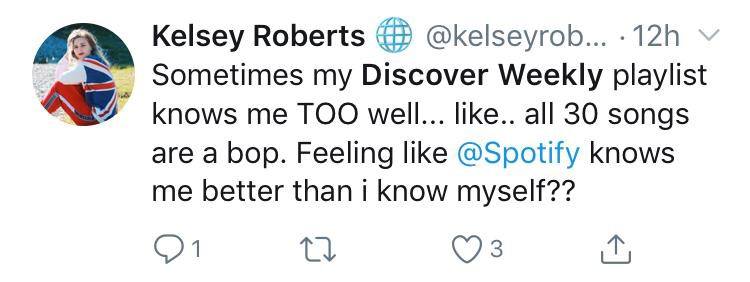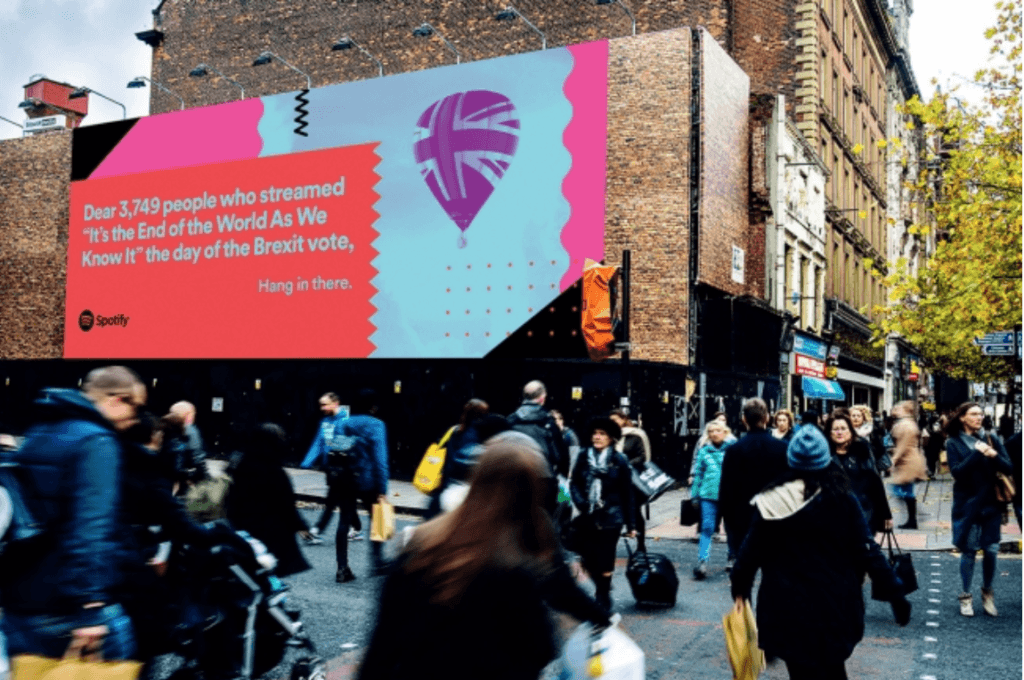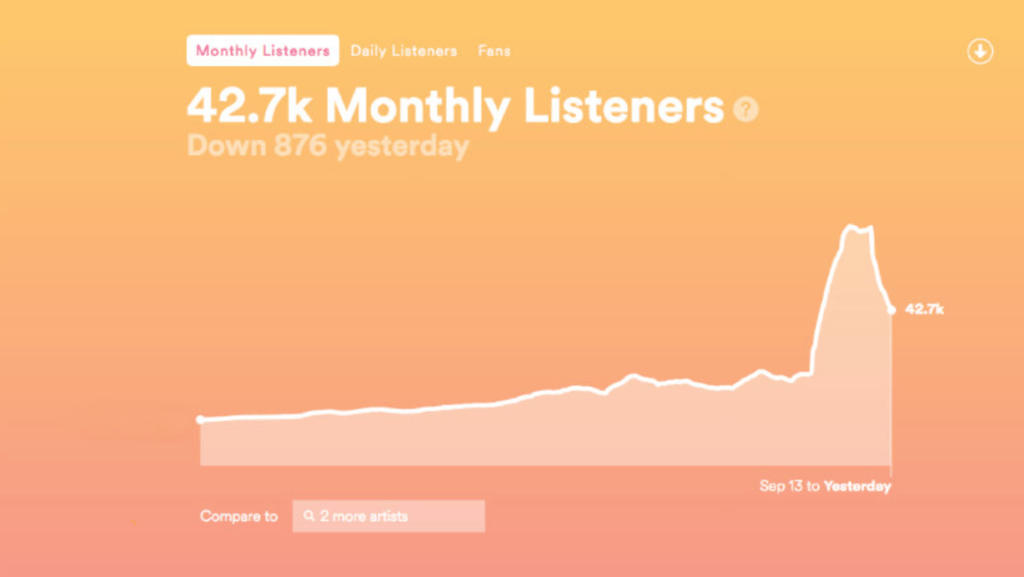How Well Does Spotify Know You?

Spotify has been able to use their vast amounts of data, analytical capabilities and AI tools to create a competitive advantage and a superior user experience.
Overview
Spotify is an on-demand music service that utilizes big data and artificial intelligence to stand out in a crowded music streaming space. As of December 2019, Spotify has 217M users that log over 100 billion data points per day. Utilizing user data and proprietary algorithms, Spotify has been able to sort and prioritize the content to create a superior, personalized user experience.
Value Creation
Spotify’s application hosts over 50M songs and 4B playlists, garnering massive amounts of data related to song preferences, search behavior, playlist data, geographic location and most used devices. Spotify performs analysis and creates machine learning algorithms based on this data to understand music tastes and ease discovery of new genres, artists and songs.
Spotify utilizes AI through their predictive recommendation engine which enables them to curate personalized playlists such as “Discovery Weekly” and “Release Radar.” The engine is built upon a combination of collaborative filtering, natural language processing and audio models to create a personalized list of thirty songs for each user. This type of recommendation engine creates value for artists who get more exposure to new users and makes customers stickier through increased satisfaction with the service. The recommendation will only become smarter over time as more and more data is fed into the ecosystem. Similar to the recommendation engine, Spotify is also experimenting with AI to facilitate the search process and streamline the user prompted discovery of new music.
Spotify has also created value specifically for the artists and managers on their platform by creating a “Spotify for Artists” tool which gives artists direct access to their data. To provide a holistic perspective on their content, Spotify has created visualizations to help artists understand user engagement, monthly/daily listeners, performance metrics and demographic details. This gives artists more control over their product and helps them understand their audience better. Managers have used these analytics to inform tour dates, locations and timing of new albums/singles. Another effort dedicated to the artist aspect of the platform is the Creator Technology Research Lab, led by Francois Pachet. The group’s goal is to utilize various AI tools to “push artists and songwriters into exciting and unchartered creative territory.” Spotify has even released songs that were wholly generated by these new AI tools.
Lastly, Spotify has been able to utilize the vast amount of data in various internal business processes. In a global ad campaign, Spotify rolled out ads that aggregated user data to create catching, playful titles that highlight specific user behavior on the platform. Spotify was able to roll out specific ads to the region in which it would resonate the most. This is a creative way to humanize the vast amounts of data that they have and encourage new users to check out the service. Another internal department that relies heavily on data analytics is the product team. They utilize A/B testing, paired with detailed quantitative and qualitative data analysis, for any new feature development to understand the true impact on user experience and behavior. For example, while testing a feature allowing users to skip ads, they realized that the number of ads that could be skipped needed to be in sync with the number of skippable songs to deliver a consistent user experience.

Opportunities and Challenges
As users continue to use the platform and more users join, Spotify’s competitive advantage stemming from their data, analytics and AI will continue to grow. Spotify will be able to use their data to create an even more personalized experience and lock users into the service. Additionally, as the amount of data grows, Spotify will gain more leverage over recording studios and artists who desperately need access to the data to make business decisions. Spotify is also starting to invest heavily in the podcast space and can leverage their knowledge on users’ preferences to cross promote this new content and increase engagement. They will also be able to repurpose their existing recommendation engine to create similar features for podcasts.
However, as they continue to invest in the data space, Spotify must be careful not to alienate the fans or the artists using the service. Spotify has developed the capability to create music with AI tools that completely remove artists from the process. It will be important for the company to correctly articulate the purpose of this type of technology, so the creative talent is stays on the platform. From a user perspective, Spotify needs to be cognizant of user privacy and data protection laws as they increasingly depend on user data in all facets of their business.
To overcome these challenges and capitalize on the opportunities, Spotify must create AI tools that empower the artists and improve the user experience. It will be important for them to be transparent about the methods data is used so that both parties feel in control of their own data.
Conclusion
Spotify has been known to push the bounds of technology in a traditionally creative industry. It will be interesting to see how Spotify continues to balance technology and art to curate a positive experience for both artists and fans.




Thanks Alli for the very interesting post!
It is fascinating how Spotify has grown in the last years. In my personal case, almost every person I know uses Spotify. I completely agree with you with the fact that Spotify has to continue investing in privacy and in articulating the value proposal for artist. Although I agree that Spotify has a competitive advantage based on strong network effects and a high number of customers, I believe that the platform should monitor the action of competitors. Competitors with a lot of cash such as Apple and Amazon could attack with aggressive promotions to take clients from Spotify platform. For that reason improving the customer experience is the best way to compete against other platforms.
Thanks for a great post, Alli!
I didn’t know about the existence of Spotify’s AI-song generating efforts. The potential of machine-generated music sounds incredibly exciting and I can imagining it revolutionizing the music industry in the future. However, the possibility of this happening is probably a very scary scenario for song-writers and composers. What would happen to them if AI-generated songs were superior to human compositions?
I love this post (and Spotify). I agree with the tweet you shared – Spotify so reliably nails it with my Discover Weekly that I’m always left feeling both grateful and a little creeped out.
My biggest question about Spotify is not value creation, but rather value capture. They made a profit for the first time in Q1 2019 (after 13 years of burning cash). Almost all of that is revenue-sharing on its subscription fees with music labels. Do you think there’s an angle for Spotify to monetize the powerful data and tools it has built for record labels, on top of the cut it takes from subscriber income? If, for example, it could tell a record label exactly what kind of artist is likely to be a chart-topper, wouldn’t that be worth a lot? Right now, it seems like the AI features are a freebie on top of the streaming platform, even though that’s the most defensible competitive advantage Spotify has. As you point out – Apple and Amazon could quickly cut streaming prices below marginal cost, in which case Spotify can’t stay profitable with just subscriber revenue alone.
Great post! I did not know about the extent to which Spotify uses AI to generate music lists. I was wondering however how it can leverage previous learning when entering new geographies. The taste of people in different places is very different. Does it mean that it has to collect fresh data to have a robust dataset to build its analytics on? Further, when spotify entered countries such as India, where the language as well as type of music ( bollywood) is completely different from that in other places, would it have to start from scratch – collecting data- analytics – AI?
I like Spotify and I see how the network effects are so helpful and of course the artists and managers seem to be able to get enormous insights from the platform. What I don’t understand very well is how do they differentiate the value that they create for a common listener. The songs that I have on Spotify everyone can also find in Apple music. Apple music also has a great AI recommendation engine to suggest me songs that I would like. It doesn’t add much value to the listener if Spotify is partnering with studios and singers and pushing them to make new songs, in the end of the day the new songs will also be available in Apple Music.
The advantage that I see now is only having the biggest market share and being able to work on all platforms such as android and iOS while Apple music is limited from the ecosystem.
I’m a big Spotify user and love all their discover playlists. I do have to say that for me Discover Weekly is hit and miss and most of the time I can find 1-2 gems if lucky. They need to improve their algorithms for cases such as excluding songs a playlist for babies/kids that you may play a lot but not because you love! Also, as Jona said, their competitive advantage is that they are very open, you can access Spotify almost everywhere (iOS, Android, PC, Sonos, Smart speakers, etc.) and they lock you down with their recommendation engine, and by having your library in place. Now, if a competitor develops a better algorithm and is able to transfer your saved songs to their platform, I don’t see myself staying in Spotify. They need to keep investing in their product to make sure that does not happen.
Thanks for a great post Ali! Most of the time I ask myself the same question and continue to be amazed by how well Spotify knows my music tastes and how accurate their recommendations are. I believe Spotify’s amazing success stems from using AI and data to create value on both sides of the platform. As you mentioned, they do this both for artists and for listeners with incredibly useful and curated features. As they gather more and more data, I only see their competitive advantage increasing. It will be interesting to see if this will be enough to keep other competitors from catching up, such as Apple music for example. In the end, the platform with the most artists will win in the long run, so keeping them happy is especially important.
Very interesting to hear that Spotify are now using AI to create their own music and I totally agree about the risk of alienating artists with such technology. If they do have these capabilities, is it possible for Spotify to diversify completely and become a music label? With AI generated music, the likelihood of a song being a hit may be high, especially if data is used to predict popularity. Could artists be interested in appearing on such records in order to increase or consolidate exposure?
Great post! Spotify has definitely built a competitive advantage over other players in the music streaming space with the amount of data they have collected from their strong market share position. You raise an interesting point with the way they can use this data not only to improve their recommendation engine but also to use it as input in the creative process. I agree that they risk alienating artists if they decide to deep dive into AI generated music, and I also think they risk alienating consumers if they monetize it by selling it to artists as input in their creative process. However, their incentive is to limit the amount of revenues they share with artists and record labels, their biggest expense items. so they might have the incentive to follow one of these strategies. It’s going to be interesting to see how that trade off plays out.
Great read! Thank you Ali.
I am a huge music fan and I have been very pleasantly surprised by Spotify’s discovery functionalities. I wonder if Spotify will be able to monetize this in the near feature by charging new independent artists a fee to be included in these playlists. Sounds like a very efficient way to reach your target listener, however I also see this could be detrimental to the user experience if suddenly you are mostly exposed to “payed” content.
I did not knew Spotify had a platform for artists. Do you know how much they charge them for the data? Sounds like a powerful tool if you are planning a tour for example.
Great post! I was interested in your comment at the end that Spotify has the technology to create new music and remove artists – I wonder if / when this technology will ever totally replace the musical artist? With the data, can they eventually design music that is more individualized and appealing based on the user? I’m somewhat skeptical of this in the short-mid term because so much of music is the choice of words, energy, etc. and until AI is at a place where it can truly understand those nuances, I don’t see them being totally disintermediated (which I don’t see Spotify as at the forefront of this technology). So artists (in my mind), despite changes to the model / earnings potential for other reasons (COVID being a great example of killing concert earnings), I see as safe from now from AI replacing their creative value.
Interesting post! I’m an avid Spotify user and believe they do an incredible job recommending new songs and artists.
I’m really intrigued by the idea of machine-generated music. I personally think fans value the “identity” of a musical artist too much to fully switch to music consumption from machines. Having said that, it may only take a small fraction of machine-generated musical content to really put economic strain on the existing production ecosystem. I already enjoy nature sounds and similar content for studying, so maybe it’s not that hard to imagine!
I discovered myself researching more on the machine learning music, that is one unexpected turn of events for me. I would imagine I’d be pushing for more aggressive partnering with music labels to help them design artists’ tours by pulling data to know, for example, where is their strongest fan base; or streaming music videos; or moving from online to offline, with concerts. I believe the language of music is close to the language of math, so I am an optimist on this machine-generated music, and intrigued to see how well AI performs in the artistic world.